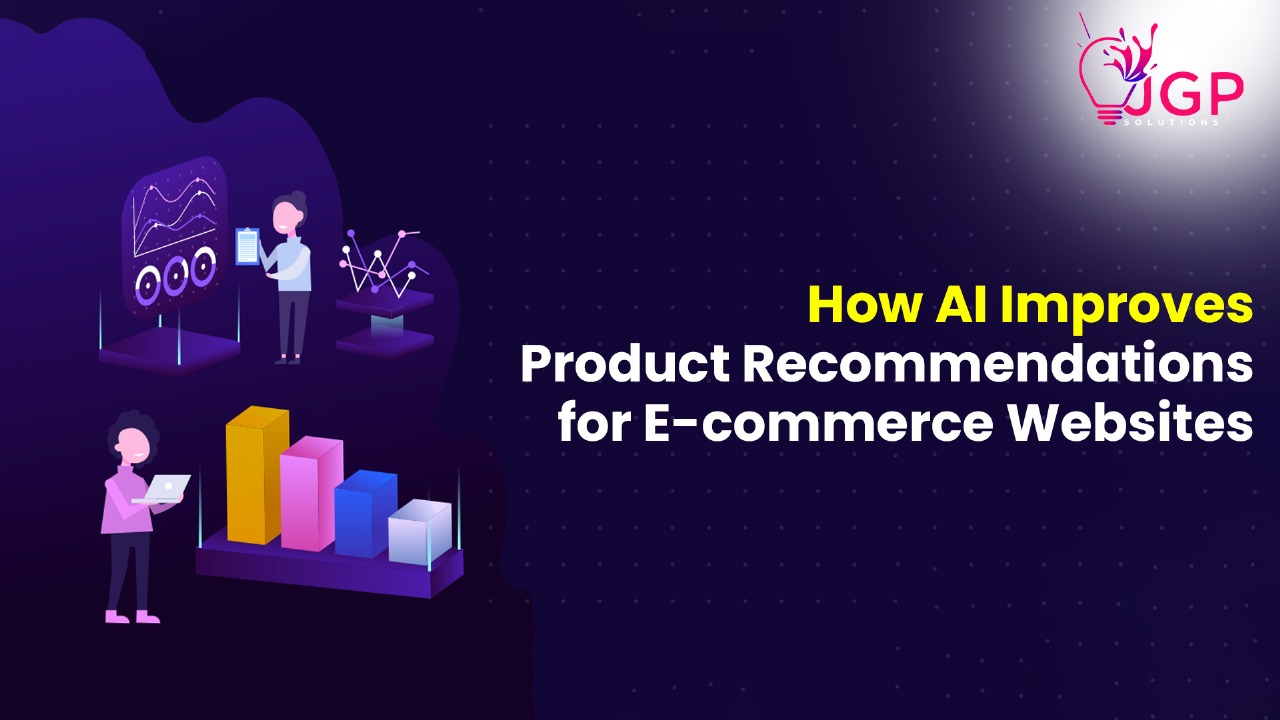How AI Improves Product Recommendations for E-commerce Websites
In the competitive world of e-commerce, providing personalized shopping experiences is a crucial factor for success. One of the most effective ways to enhance customer experience and drive sales is through product recommendations. In recent years, Artificial Intelligence (AI) has revolutionized how e-commerce websites deliver these recommendations, making them more accurate, personalized, and engaging. At JGPSolutions.in, we recognize the importance of using AI to optimize e-commerce platforms, ensuring that businesses can offer their customers a seamless and satisfying shopping experience. Let’s explore how AI is improving product recommendations for e-commerce websites and why this is vital for your business.
1. Personalized Shopping Experience
Gone are the days of generic product suggestions that fail to resonate with individual shoppers. AI enables e-commerce platforms to offer highly personalized recommendations based on a shopper’s previous behavior, preferences, and even demographics. By analyzing data such as:
- Purchase history
- Browsing behavior
- Search queries
- Time spent on particular products
AI can suggest products that are highly relevant to each customer. This level of personalization increases the likelihood of conversion, as customers are more likely to purchase items that align with their specific needs and preferences.
2. Enhanced Customer Segmentation
AI-powered product recommendation systems are able to segment customers into different groups based on their behavior patterns. Through machine learning algorithms, AI identifies common traits among users, such as their buying habits, price sensitivity, and preferred product categories.
This allows e-commerce websites to recommend products tailored not only to individual customers but also to specific customer segments. For example, AI might recognize that a segment of users tends to buy tech gadgets during holiday sales, while another segment prefers eco-friendly products. By providing the right products to the right segments, businesses can significantly improve their marketing efforts and customer engagement.
3. Real-Time Recommendations
AI’s ability to process data in real-time is one of its most valuable features for e-commerce websites. As customers interact with the website, AI systems can dynamically adjust product recommendations based on their real-time behavior.
For example, if a customer adds a product to their shopping cart but doesn’t complete the purchase, the recommendation engine can suggest similar items or accessories that complement their current selection. Similarly, if a customer browses multiple product categories, AI can recommend items from related categories, creating a cross-selling opportunity that enhances the customer’s shopping experience.
4. Collaborative Filtering for Accurate Suggestions
One of the most popular AI techniques for improving product recommendations is collaborative filtering. This method analyzes user behavior data to identify patterns in purchasing or browsing activities. For instance, if users who bought Product A also frequently purchased Product B, the system will recommend Product B to customers who are interested in Product A.
Collaborative filtering is particularly effective when there’s a vast catalog of products, as it can identify connections between items that may not be immediately obvious. By leveraging the collective behavior of customers, AI can make highly accurate predictions about what products an individual customer might be interested in.
5. Content-Based Filtering for More Precision
In addition to collaborative filtering, AI also uses content-based filtering to enhance product recommendations. This method takes into account the features of the products themselves, such as:
- Category
- Brand
- Size
- Color
- Price range
AI can recommend products that are similar to those a customer has previously viewed or purchased based on these characteristics. For example, if a customer has purchased a red dress from a particular brand, the AI system may recommend other red dresses from the same brand or dresses with similar designs. This type of recommendation helps to refine the shopping experience by focusing on specific product attributes.
6. AI-Driven Visual Search for Easier Discovery
AI technology has also introduced visual search capabilities to e-commerce platforms, allowing customers to upload images and find similar products instantly. If a customer sees a product they like in a photo, on social media, or in a magazine, they can use visual search to find similar items on an e-commerce website.
This feature enhances product discovery by recommending items that closely match the image provided by the customer. For example, if a shopper uploads an image of a pair of shoes they like, AI can find similar styles and provide product recommendations based on the visual attributes of the shoes.
7. Smart Cross-Selling and Upselling
AI-driven recommendation systems are also excellent tools for cross-selling and upselling. By analyzing customers’ past purchases and preferences, AI can suggest additional items that complement the products customers are already interested in.
For example, if a customer is purchasing a camera, AI might suggest a lens, camera bag, or memory card. This personalized approach increases average order value (AOV) by encouraging customers to purchase related products they may not have considered initially.
8. Improved Customer Retention with Predictive Recommendations
AI can also help with predictive recommendations, where the system forecasts what a customer is likely to need in the future. By analyzing purchasing trends and seasonal behavior, AI can predict which products a customer may be interested in and recommend them at the right time.
For example, if a customer typically purchases fitness equipment at the beginning of the year, AI can send them tailored recommendations for fitness-related products when they’re most likely to make a purchase. This predictive capability not only improves the customer experience but also helps businesses stay relevant and top-of-mind for their customers.
9. A/B Testing and Optimization
AI also plays a crucial role in optimizing product recommendations through continuous testing. By running A/B tests, AI systems can experiment with different recommendation algorithms and determine which ones perform the best in terms of engagement and conversions.
This helps e-commerce businesses refine their strategies and continually improve the accuracy and effectiveness of their product recommendations, ensuring that customers are always presented with the most relevant products.
10. Increased Sales and Customer Satisfaction
Ultimately, the integration of AI into product recommendation systems drives increased sales and higher customer satisfaction. Customers appreciate personalized experiences that make shopping easier and more enjoyable, while businesses benefit from higher conversion rates and a better understanding of customer needs and preferences.
Conclusion
AI is fundamentally changing how e-commerce websites recommend products to their customers, offering smarter, more personalized, and real-time suggestions. By integrating AI into product recommendation systems, businesses can create more engaging shopping experiences, enhance customer satisfaction, and boost sales. At JGPSolutions.in, we are committed to helping e-commerce businesses leverage AI to optimize their online presence and drive success.
If you’re ready to take your e-commerce platform to the next level, integrating AI-powered product recommendations can be a game-changer for your business!



